Quantitative Tightening: The Road Ahead
with
Frances Coppola
Wednesday 19th October 2022
In 2001, the Bank of Japan began purchasing government bonds in an effort to increase current account balances held by financial institutions at the Bank. Quantitative easing was born, and remained fresh in the memory of policymakers as the financial crisis hit. The policy helped to avoid a prolonged depression in an environment where interest rates were close to their zero lower bound in many countries across the globe.
Over ten years later, the story remained similar. Few nations had significant room to reduce interest rates at the outset of Covid, meaning “unconventional monetary policy” was relied heavily upon. Since March 2020, in the UK alone, £450bn worth of bonds were purchased through QE, helping to stabilize financial markets and keep borrowing costs low. At the same time, the unprecedented liquidity it provided contributed to a sharp increase in asset prices, causing negative distributional effects.
With economies opening up post-Covid, and the inflationary pressure that came with it, central banks have already decided to stop reinvesting maturing assets. Quantitative easing seems to be making way for quantitative tightening. What impact will this have on financial markets and the wider economy? We’ll be joined by Frances Coppola to discuss the future of this not-so-unconventional monetary policy.
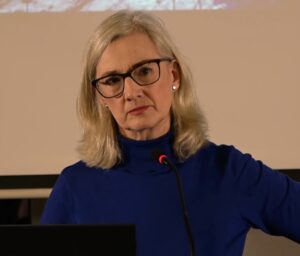 Frances Coppola is the author of the widely read Coppola Comment finance and economics blog. She spent 17 years working as a business analyst and project manager, running systems projects for banks such as RBS, NatWest, and HSBC, and completed an MBA at Cass Business School, specialising in financial risk management.
Frances Coppola is the author of the widely read Coppola Comment finance and economics blog. She spent 17 years working as a business analyst and project manager, running systems projects for banks such as RBS, NatWest, and HSBC, and completed an MBA at Cass Business School, specialising in financial risk management.
The Future of Work
with
Jon Cruddas MP, Richard Burge, and Matt Warman MP
Tuesday 28th June 2022
The Covid 19 pandemic brought unprecedented challenges to the labour market and radically altered our relationship with work. It served to provide new meaning to the ‘place of work’ and has gone some way to shift perceptions of the value of time. Is the impact of the crisis now firmly embedded in the labour market?
The pandemic may have simply accelerated long term trends. Ever-increasing automation and digitisation have the potential to bring about extensive economic benefits but have also been seen as threats to workers in certain industries. It has posed serious questions around issues such as inequality. How does society address the unintended consequences of shifting structures within the labour market? We were incredibly lucky to be joined by three well-placed leaders in Jon Cruddas MP and Richard Burge to discuss these themes.
Jon Cruddas MP
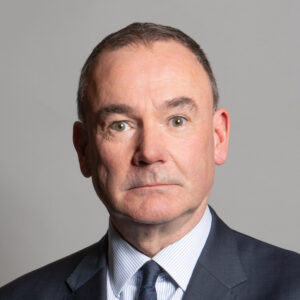
Jon Cruddas is the Member of Parliament for Dagenham and Rainham, having first been elected in 2001. He received a PhD in Industrial and Business Studies, writing the thesis An Analysis of Value Theory, the sphere of production, and contemporary approaches to the reorganisations of workplace relations. After the 1997 election, Jon served as Tony Blair’s deputy political secretary, which involved liaising with trade unions and working on the introduction of the minimum wage. He stood for the deputy leadership of the Labour Party in 2007 and became Policy Coordinator for the Labour Party under Ed Miliband’s leadership. He is the author of The Dignity of Labour, in which he examines socialist thought on work in order to critique tendencies towards technological determinism. You can find the book here.
Richard Burge
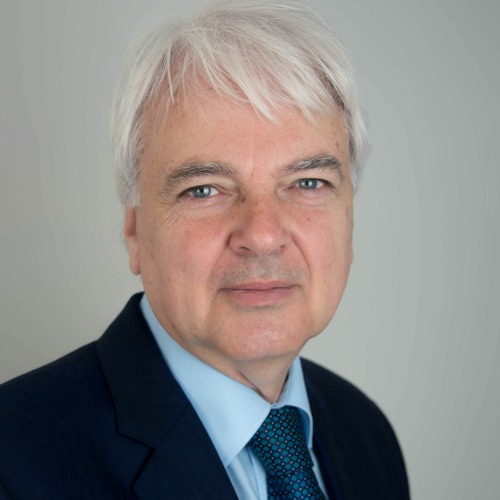
Richard Burge has been the CEO of the London Chamber of Commerce and Industry since 2020. Prior to this, Richard served as an independent advisor on trade, conflict, and development. His vast executive-level experience has seen him act as the CEO of 4-multimillion-pound organisations, serving on the board of a further five.
Matt Warman

Matt Warman is the MP for Boston and Skegness, having assumed office in 2015. During his time in Parliament, he has held the role of Minister for Digital Infrastructure, Minister for Digital and Broadband, and Assistant Government Whip. Crucially, he sat on the Science and Technology Select Committee before becoming a Minister and served as a journalist with a focus on technology before being elected to Parliament.
The Economics of the Stock Market
with
Andrew Smithers
Thursday 5th May 2022, online
Since the 2008 financial crisis the neoclassical understanding has increasingly been acknowledged as an unsatisfactory theory on which to base economic policy. Its failure to incorporate finance in its models is often identified as its most obvious weakness.
While the stock market is not the only form of finance which needs to be incorporated into a satisfactory model for the economy, Andrew Smithers understands its importance. He joined us to explain that the objections to the neoclassical consensus, and the claims of his proposed model, are supported by evidence and suggest that the latter should therefore be preferred.
Andrew Smithers

Andrew Smithers is a leading expert on financial economics and global asset allocation. His vast experience in international investment includes twenty-seven years at SG Warburg & Co where, amongst other roles, he ran the very successful investment management division.
For over 20 years until its closure in August 2014 he ran his own investment consultancy firm, Smithers & Co. Ltd, based in London, advising fund managers both in the UK and globally on international asset allocation.
He is the author of several well received books on international finance: Valuing Wall Street, co-written with Stephen Wright, Japan’s Key Challenges for the 21st Century, co-written with David Asher, and Wall Street Revalued – Imperfect Markets and Inept Central Bankers.
Andrew has been a Trustee of the Daiwa Anglo-Japanese Foundation and a member of the Advisory Board for the Centre for International Macroeconomics and Finance (“CIMF”) at Cambridge University and is a Fellow of CFA (UK).
As head of Smithers & Co., Andrew helped pioneer the application of academic analysis of financial economics to investment management. He is well known for his work on valuing markets including the application of ‘q’, for his pioneering studies on the distorting impact of employee stock options on US profits and for work on showing the understatement of Japanese published profits compared with US ones.
Why GDP Must Change
with
Ehsan Masood
Wednesday 13th April 2022
GDP has grown from a simple economic tool to being the universal measure of economic progress. Despite humble beginnings, policymakers around the world now wait with bated breath at each GDP announcement. But a potent mix of technology, climate change and now war in Europe threatens its position as the world’s most powerful formula. Ehsan Masood joined us to discuss the uses and abuses of GDP, and how and why it needs to change.
Ehsan Masood

Ehsan Masood is a science and policy journalist, currently working as a senior editor at Nature. Prior to this, he was Editor of the science policy magazine *Research Professional News, and taught science and innovation policy at Imperial College London. He is the author of GDP: The World’s Most Powerful Formula and Why it Must Now Change, a compelling account of GDP and the people who made it happen. You can find out more about his book here and in this BBC Radio 4 interview here.
The Outlook for the UK Economy
with
Silvana Tenreyro
Wednesday 2nd March 2022
In addition to its enormous effects on public health and society, two years of the pandemic have also created challenges for the UK economy. At present, increases in the prices of energy and global goods are leading to higher inflation and falling real wages, putting a strain on families throughout the country. Silvana Tenreyro joined us to discuss the outlook for the UK economy and inflation. She focussed on the trade-offs the economic outlook has created for monetary policymakers, when judging how best to bring inflation back to target.
Silvana Tenreyro

Silvana is an External Member of the Monetary Policy Committee of the Bank of England, having been appointed for a second term in 2020. She is a Professor of Economics at the London School of Economics. She has previously served as the President of the European Economic Association, MPC member of the Central Bank of Mauritius, as well as an economist for the Federal Reserve Bank of Boston, having acquired her PhD from Harvard University.
The 10th Annual Clash of the Titans
Economic Forecasting Competition
13th December 2021 from 7pm, online
The Economic Research Council ran its tenth annual Clash of the Titans economic forecasting event, which brought together three thought-leaders in economics in the UK. The Clash of the Titans was an unrivalled opportunity to hear economic experts detail their predictions for 2022. Titans each predicted figures for GDP growth, inflation, unemployment, earnings growth and interest rates, as well as a black swan event which could upset their forecasts. The audience and others then entered their own predictions and everyone competes over the following year, with the winning titan and leading public entrant crowned at the next event.
 Dr Linda Yueh – Economist, Broadcaster, and Author
Dr Linda Yueh – Economist, Broadcaster, and Author
Dr Linda Yueh is Fellow in Economics, St Edmund Hall, Oxford University and Adjunct Professor of Economics, London Business School. She is also Visiting Professor at LSE IDEAS and Chair of the LSE Economic Diplomacy Commission. Her book, The Great Economists: How Their Ideas Can Help Us Today, was The Times’ Best Business Books of 2018. Aside from her academic work, Linda is also a TV and radio presenter, including for BBC Radio 4 and the World Service. She has been Chief Business Correspondent for BBC News as well as Economics Editor at Bloomberg TV.
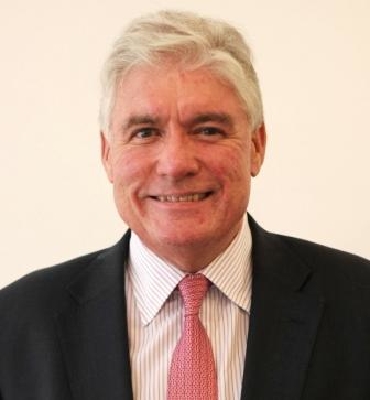 Professor Douglas McWilliams – Executive Deputy Chairman, CEBR
Professor Douglas McWilliams – Executive Deputy Chairman, CEBR
Douglas is one of the world’s leading economists and was chosen in 2012 from over 300 applicants to become the Gresham Professor of Commerce.
His Gresham lecture series ‘The world’s greatest ever economic event’ looking at the impact of globalisation on the Western economies attracted widespread attention and large audiences. He covers all aspects of economics but is best known for his work in forecasting, the economics of the IT and telecoms sectors and transport economics and for his knowledge of the Far East economies. He works with clients who are particularly looking for an economist with a public presence to help make their case. After setting up the Centre for Economics and Business Research (CEBR), he was the Chief Executive for 20 years, and Executive Chairman. Previously he was Chief Economic Adviser to the Confederation of British Industry and Chief Economist for IBM UK.
 Dilip Shah – Clash of the Titans Best Performer
Dilip Shah – Clash of the Titans Best Performer
Dilip Shah has been an economist for over 15 years working in both the public and private sector. As a regular entrant of the public Clash of the Titans forecasting competition, Dilip has excelled with his forecasts. He has won the overall competition on two occasions, beating all previous professional titans and hundreds of public entrants. Dilip has almost always ended up in the top ten with forecasts that barely differ from the real data.
 Our host for the evening is Yael Selfin, Chief Economist at KPMG.
Our host for the evening is Yael Selfin, Chief Economist at KPMG.
Yael is Chief Economist at KPMG in the UK. Her research centres on the impact major issues including Brexit and other geopolitical events are likely to have on the economy as well as on individual businesses. Prior to joining KPMG in 2014 she worked at two independent economic consultancies as well as at PwC for over 14 years, where she set up and led their Macro Consulting business, as well as oversaw their international economic research. She has a BSc in Economics from UCL and did further studies in Advanced Econometrics at LSE. She also has a Chartered Accountant qualification.
COP26 Debrief
The Economic Impact of the Conference
with
Simon Mundy
Monday 29th November 2021, online
COP26 was eagerly observed, as the world anticipated the commitments that would arise to address the climate crisis. More than 130 heads of state descended on Glasgow to take part in what has been dubbed a critical summit for action on climate change. Simon Mundy joined us to forensically analyse the outcomes of the conference, as well as discuss likely economic consequences arising from it.
Simon Mundy
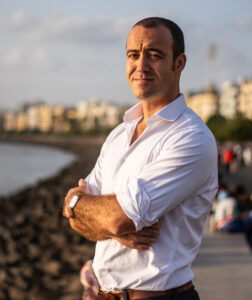
Simon Mundy is Moral Money Editor at the Financial Times. After starting his career in Johannesburg, he has had stints reporting in London, Seoul, and Mumbai. He is the author of the recently released Race for Tomorrow, an exploratory journey through 26 countries on the front line of climate change, meeting people whose lives are changing due to it. You can find out more about his book here.
Unearthing the Import of the Payment System
With
Natasha de Terán
Wednesday 6th October 2021, online
Mobile internet, cookies, and payments are a ubiquitous part of our lives, yet few people know how they function, or their potential wider impact. That was certainly true for the first two until Huawei’s ban and GDPR respectively brought them into the limelight. In her book The Pay Off co-written with former CEO of SWIFT Gottfried Leibbrandt, Natasha de Terán manages to do the same for the international payment system. She joined us in this webinar to bring the system to light, highlighting the social, economic, and geopolitical impact of our payment choices.
Natasha de Terán
 We were incredibly pleased to host Natasha, who sits on the Payment Systems Regulator Panel and the Financial Services Consumer Panel of the FCA, having previously held the roles of Head of Corporate Affairs and Head of Public Affairs at SWIFT, the world’s largest payments dependency. She drew on this, as well as her journalistic experience, to unearth the workings the payment system in her most recent book.
We were incredibly pleased to host Natasha, who sits on the Payment Systems Regulator Panel and the Financial Services Consumer Panel of the FCA, having previously held the roles of Head of Corporate Affairs and Head of Public Affairs at SWIFT, the world’s largest payments dependency. She drew on this, as well as her journalistic experience, to unearth the workings the payment system in her most recent book.
ERC Viewpoints: Monopsony Capital
with
Ashok Kumar
Wednesday 21st April 2021
Monopsony Capitalism explores the combination of capital’s changing composition and labour’s subjective agency to examine whether the waning days of the ‘sweatshop’ have indeed begun. Focused on the garment and footwear sectors, it introduces a universal logic that governs competition and reshapes the chain. You can find out more about the book here: Monopsony Capitalism
Ashok Kumar

Ashok Kumar is a Lecturer of Political Economy at Birkbeck, University of London. Ashok published widely in both academic journals on a wide array of topics including land economy, primitive accumulation, globalization, and workers’ bargaining power. His most recent book is Monopsony Capitalism: Power and Production in the Twilight of the Sweatshop Age.
The Future of the EU after Brexit
ERC Viewpoints
Yanis Varoufakis in conversation with Lord Lamont
Wednesday 27th January 2021
In the first of our 2021 ERC Viewpoints webinars, ERC president Lord Lamont hosted Yanis Varoufakis in a timely discussion of the future of the European Union following Britain’s departure. Lord Lamont and Yanis Varoufakis’ discussion covered the hopes and fears for the future and the probable effect of Britain’s exit from the EU. After touching on the negotiation of the Brexit deal, we heard an outline of Mr Varoufakis’ own vision for the European Union.
Yanis Varoufakis

Yanis Varoufakis is a member of Greece’s Parliament and parliamentary leader of MeRA25, the Greek political party belonging to DiEM25 – Europe’s first transnational paneuropean movement. Previously, he served as Greece’s Finance Minister during the first six months of 2015. In his own words, Varoufakis was “thrust onto the public scene by Europe’s inane handling of an inevitable crisis”. In January 2015 he was elected to Greece’s Parliament with the largest majority in the country and served as Greece’s Finance Minister (January to July 2015). During his term he experienced first hand the authoritarian inefficiency of the European Union’s institutions and had to negotiate with the Eurogroup, the European Central Bank and the International Monetary Fund. Varoufakis resigned the finance ministry when he refused to sign a loan agreement that perpetuated Greece’s debt-deflationary cycle.
Varoufakis read mathematics and economics at the Universities of Essex and Birmingham and subsequently taught economics at the Universities of East Anglia, Cambridge, Sydney, Glasgow, Texas and Athens where he still holds a Chair in Political Economy and Economic Theory. He is also Honorary Professor of Political Economy at the University of Sydney, Honoris Causa Professor of Law, Economics and Finance at the University of Torino, Visiting Professor of Political Economy at King’s College, London, and Doctor of the University Honoris Causa at University of Sussex.
He is the author of a number of best-selling books, including Another Now: Dispatches from an alternative present (London: Bodley Head, 2020), Adults in the Room: My struggle against Europe’s Deep Establishment (London: Bodley Head, 2017); Talking to My Daughter About the Economy: A brief history of capitalism (London: Bodley Head, 2017), And the Weak Suffer What They Must? Europe, Austerity and the Threat to Global Stability (London: Bodley Head and NY: Nation Books, 2016); and The Global Minotaur: America, Europe and the Future of the World Economy (London: Zed Books, 2011,2015). His academic books include Economic Indeterminacy (London: Routledge, 2014); Foundations of Economics (London: Routledge, 1998); and Rational Conflict (Oxford: Blackwell, 1991).
In February 2016 Varoufakis co-founded DiEM25, the Democracy in Europe Movement – Europe’s first transnational movement. In March 2018 DiEM25 founded MeRA25, its Greek political party. Led by Varoufakis, MeRA25 entered Parliament with nine MPs in the July 2019 General Election.
- For more information on Yanis Varoufakis visit: http://yanisvaroufakis.eu/
- For his Ted Global talk click here
- For more information on DiEM25, click here
- For more on MeRA25 in English, click here.
Lord Lamont
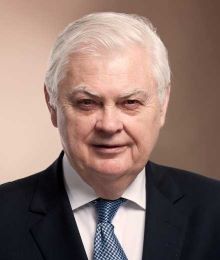
The Rt Hon the Lord Lamont of Lerwick was at the centre of British politics for many years. He was Chancellor of the Exchequer from 1990–93 and Chief Secretary to the Treasury under Margaret Thatcher. He was a member of the House of Commons for 25 years. He was also a Minister in the Departments of Energy, Defence and Industry. He is currently a director of or consultant to a number of companies in the financial sector, several with Middle East involvement. He is Chairman of the British Iranian Chamber of Commerce, President of the Economic Research Council and a former Chairman of Le Cercle (a foreign affairs think tank). He was made a Life Peer in July 1998. He is an Honorary Fellow of Fitzwilliam College, Cambridge.
Introduced by Jacqueline Mallender

Jacque is a respected international health and public policy economist. Over the last 35 years, she has directed many strategic engagements in healthcare, crime, justice, home affairs, education, employment and social welfare. She has worked in the UK health sector throughout her career; internationally she has directed projects and/or provided subject matter expertise to clients in Europe, North America, and, more recently, the Middle East.
Her experience includes: the economics of public health; service and care-pathway design across all diseases and population groups; healthcare systems including contracting and financing; and access to healthcare and disparities for vulnerable groups. Recent interests include value-based healthcare systems, and integrated health and social care and the role of digital health in accelerating improvement. She has a keen subject matter expertise in crime and justice, migration and home affairs and civil justice.
Jacque is an associate of the Oxford Centre for Triple Value Healthcare and sits on the Advisory Board for the Nottingham University School of Economics. Jacque was a founding convener of the joint Campbell and Cochrane Economics Methods Group and for 15 years was a committee member of the Campbell Collaboration Crime and Justice Coordinating Group. Jacque regularly speaks at international events, chairs panels at national and international academic and industry conferences, and designs and delivers training for healthcare evaluation teams.
What will 2021 bring?
The Recipe for Portfolio Resilience
with
Simona Paravani-Mellinghof
Looking ahead to 2021, Simona Paravani-Mellinghoff explored the key investment themes: navigating a lower-for-longer interest rate environment, the sustainability trend, and the importance of portfolio construction for uncertain times. What risks could rock the boat?
Simona Paravani-Mellinghoff, Global CIO of Solutions, BlackRock.

The Multi-Asset Strategies & Solutions (MASS) team is the investment group at the heart of BlackRock’s portfolio construction, asset allocation, and active management ecosystem. MASS draws on the full toolkit of BlackRock’s index, factor, and alpha-seeking investment capabilities to deliver precise investment outcomes and cutting-edge alpha insights. MASS constructs active asset allocation strategies and whole portfolio solutions across a wide spectrum of commingled funds, separate accounts, model portfolios, and outsourcing solutions in the wealth and institutional channels.
Prior to joining Blackrock in 2015, Ms Paravani-Mellinghoff spent ten years at HSBC where she held a number of senior positions in Hong Kong, London and New York including Global Investment Strategist and CIO in the asset management division. During her tenure at HSBC, Ms Paravani-Mellinghoff was responsible for a range of investment solutions covering both institutional and retail clients including being the lead PM on the World Selection global range. Prior to HSBC, she was the quantitative strategist at Julius Baer Asset Management in Zurich. She started her career in 1998 as a quantitative analyst at Orbis in London.
Ms Paravani-Mellinghoff was named for two consecutive years in 2009 and 2010 as a rising star of finance under 40 by Financial News, a sister company of the Wall Street Journal. She is Industrial Professor at the Institute of Finance and Technology at UCL where she teaches Financial Analytics and Machine Learning. She earned both a BA and MA in Economics from Cambridge University.
Ms Paravani-Mellinghoff is a published author and sits on the board of financial education charity MyBnk.
‘Social Care Funding: Who should pay?’
with
Natasha Curry
13th October 2020
Covid-19 has thrust social care into the political and public limelight. While the crisis has not revealed any new problems, it has highlighted and exacerbated the fault lines in England’s creaking care system. Debate about the need to reform the system has been rolling for over 20 years, yet the system remains unfair, complex, confusing, and underfunded. A decade of austerity has seen the gulf between need for care and funding widen, leaving services in a very precarious state.
Political consensus about the need for reform has been growing steadily over the last year and public support for change appears to be high. But experience dictates that reform is not likely to be plain-sailing. Proposals for reform have repeatedly snagged on the thorny issue of who should pay for care. The experience of Labour party in 2010 and Conservatives in 2017 demonstrates how deeply political this territory is.
In this seminar, Natasha Curry of the Nuffield Trust will be discussing why attempts at funding reform have been unsuccessful so far. Drawing on her international research, she will reflect on why other countries have managed to enact change where England has failed. She will discuss the reform processes that Germany and Japan underwent and explain how their governments have decided to fund care. Natasha will seek to consider the funding options that are being considered and the possibilities available to the English government.
Natasha Curry, Deputy Director of Policy, Nuffield Trust

Natasha Curry joined the Nuffield Trust in 2011 as a Senior Fellow in Health Policy. Prior to joining the Trust, she worked as a Fellow in Health Policy at the King’s Fund. Natasha has just recently been named one of the Health Service Journal’s ‘100 wild cards’.
Natasha has an interest in international health and social care systems and is leading the Trust’s work on social care. She has researched and published on a range of topics, including clinical commissioning, integrated care, primary care, long-term conditions and NHS reform.
As part of her work on social care, Natasha has been to Japan twice to study its long-term care system and published a paper in May 2018 reflecting on the lessons England could learn as it considers the future of its own social care system. She also published a paper in 2019 on the German long-term care system in order to further inform the debate about the options available to England.
Previously, Natasha has worked as a consultant in health at Matrix Research & Consultancy Ltd and as the Evaluations Officer at the Chinese National Health Living Centre, prior to which she spent time living and working in China. Natasha has a degree in geography from Cambridge University.
Chaired by Jacqueline Mallender
Jacque is a respected international health and public policy economist. Over the last 35 years, she has directed many strategic engagements in healthcare, crime, justice, home affairs, education, employment and social welfare. She has worked in the UK health sector throughout her career; internationally she has directed projects and/or provided subject matter expertise to clients in Europe, North America, and, more recently, the Middle East.
Her experience includes: the economics of public health; service and care-pathway design across all diseases and population groups; healthcare systems including contracting and financing; and access to healthcare and disparities for vulnerable groups. Recent interests include value-based healthcare systems, and integrated health and social care and the role of digital health in accelerating improvement. She has a keen subject matter expertise in crime and justice, migration and home affairs and civil justice.
Jacque is an associate of the Oxford Centre for Triple Value Healthcare and sits on the Advisory Board for the Nottingham University School of Economics. Jacque was a founding convener of the joint Campbell and Cochrane Economics Methods Group and for 15 years was a committee member of the Campbell Collaboration Crime and Justice Coordinating Group. Jacque regularly speaks at international events, chairs panels at national and international academic and industry conferences, and designs and delivers training for healthcare evaluation teams.
Has China Won?
with
Prof. Kishore Mahbubani
Wednesday July 29th 2020

A veteran diplomat, student of philosophy, and author of eight books, Kishore Mahbubani is currently a Distinguished Fellow at the Asia Research Institute, National University of Singapore. Mahbubani is also a former President of the UN Security Council (Jan 2001, May 2002) and the Founding Dean of the Lee Kuan Yew School of Public Policy (2004-2017). Mahbubani writes and speaks prolifically on the rise of Asia, geopolitics and global governance. His eight books and articles in the New York Times, Washington Post, Financial Times and Foreign Affairs have earned him global recognition as “the muse of the Asian century.” He was inducted into the American Academy of Arts and Sciences in October 2019. He will join us to discuss his latest book, Has China Won?, was released on 31st March 2020. You can purchase the book using this link.
Local Economic Impacts of COVID-19
Wednesday 17th June 2020
The COVID-19 pandemic is a health crisis. Moreover, as a succession of macroeconomic forecasts are now showing, the pandemic is also a major economic shock. However, place matters, and the distribution of impacts will vary across areas of the UK. Taking a local perspective, and drawing on ongoing work by Cambridge Econometrics, this talk will consider the geography of the potential economic impacts through the lenses of economic exposure, wider economic impacts, and resilience and the prospects for recovery.
Chris Thuong

Chris Thoung is an Associate Director at Cambridge Econometrics, overseeing the company’s work on social policy issues including jobs, skills, demography, health and inequality. He specialises in economic analysis to inform public policy for local and national governments, international organisations, and NGOs. Much of his recent work has considered regional variations in the circumstances of local areas and what this might mean for their prospects and policy action. As well as consultancy, Chris has previously held roles in the public sector and think tanks.
Ben Gardiner

Ben Gardiner is a Director of Cambridge Econometrics, where he leads the Regions, Cities and Local Areas team. His work ranges from projects for regional bodies (such as the Midlands Economic Observatory, the Northern Powerhouse, and on a forecasting model for the East of England), to city groups such as the Core Cities Group and individual cities such as London, Milton Keynes, Oxford, and Leeds. Most work involves investigating economic performance, economic resilience and relating this to strategy and policy actions. Alongside his role at Cambridge Econometrics he has worked at the European Commission as a senior scientist and as a research associate at Cambridge University.
Chaired by Jacqueline Mallender

Jacque is a respected international health and public policy economist. Over the last 35 years, she has directed many strategic engagements in healthcare, crime, justice, home affairs, education, employment and social welfare. She has worked in the UK health sector throughout her career; internationally she has directed projects and/or provided subject matter expertise to clients in Europe, North America, and, more recently, the Middle East.
Her experience includes: the economics of public health; service and care-pathway design across all diseases and population groups; healthcare systems including contracting and financing; and access to healthcare and disparities for vulnerable groups. Recent interests include value-based healthcare systems, and integrated health and social care and the role of digital health in accelerating improvement. She has a keen subject matter expertise in crime and justice, migration and home affairs and civil justice.
Jacque is an associate of the Oxford Centre for Triple Value Healthcare and sits on the Advisory Board for the Nottingham University School of Economics. Jacque was a founding convenor of the joint Campbell and Cochrane Economics Methods Group and for 15 years was a committee member of the Campbell Collaboration Crime and Justice Coordinating Group. Jacque regularly speaks at international events, chairs panels at national and international academic and industry conferences, and designs and delivers training for healthcare evaluation teams.
Banking over the last 50 Years:
Rising and Falling Fortunes
with
Brian Caplen
24th February 2020
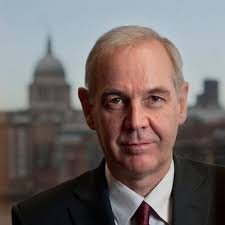
The Banker’s Top 1000 ranking of world banks is an industry standard, much relied upon by both bankers and analysts as a way of comparing institutions. In 2020, the ranking turns 50 years old providing the opportunity to look at how the fortunes of different banks have risen and fallen over the years.
In a special talk to commemorate The Top 1000 at 50, The Banker’s editor looks at how the ranking was once dominated by American banks, then European, then Japanese and now Chinese. He will also explore the impact of the financial crisis on banking and the huge transformations that have taken place since 1970.
The 9th Annual
Economic Forecasting Competition
in association with KPMG
10th December 2019
Our titans are detailed below- with our host for the evening at the bottom…
Linda Yueh – Economist, Broadcaster, and Author

Professor Linda Yueh is Fellow in Economics, St Edmund Hall, Oxford University and Adjunct Professor of Economics, London Business School. She is also Visiting Professor at LSE IDEAS and Chair of the LSE Economic Diplomacy Commission. Her latest book, The Great Economists: How Their Ideas Can Help Us Today, was The Times’s Best Business Books of 2018.
Professor Douglas McWilliams – Executive Deputy Chairman, CEBR

Douglas is one of the world’s leading economists and was chosen in 2012 from over 300 applicants to become the Gresham Professor of Commerce.
His Gresham lecture series ‘The world’s greatest ever economic event’ looking at the impact of globalisation on the Western economies attracted widespread attention and large audiences. He has recently published an updated paperback version of his book, The Flat White Economy. He covers all aspects of economics but is best known for his work in forecasting, the economics of the IT and telecoms sectors and transport economics and for his knowledge of the Far East economies. He works with clients who are particularly looking for an economist with a public presence to help make their case. After setting up Cebr, he was the Chief Executive for 20 years, and Executive Chairman. Previously he was Chief Economic Adviser to the Confederation of British Industry and Chief Economist for IBM UK. Douglas is famed for his communications skills and is one of the most widely quoted economists.
Dilip Shah – Clash of the Titans Best Performer

Dilip Shah has been an economist for 15 years working in both public and private sector. As an entrant of the public Clash of the Titans forecasting competition for six years, Dilip has excelled with his forecasts. He has won the overall competition on two occasions, beating all previous professional titans and hundreds of public entrants. For five out of six years Dilip has ended up in the top ten with forecasts that barely differ from the real data at all.
Yael Selfin – Chief Economist at KPMG and our Host
 Yael is Chief Economist at KPMG in the UK. Her research centres on the impact major issues including Brexit and other geopolitical events are likely to have on the economy as well as on individual businesses. Prior to joining KPMG in 2014 she worked at two independent economic consultancies as well as at PwC for over 14 years, where she set up and led their Macro Consulting business, as well as oversaw their international economic research. She has a BSc in Economics from UCL and did further studies in Advanced Econometrics at LSE. She also has a Chartered Accountant qualification.
Yael is Chief Economist at KPMG in the UK. Her research centres on the impact major issues including Brexit and other geopolitical events are likely to have on the economy as well as on individual businesses. Prior to joining KPMG in 2014 she worked at two independent economic consultancies as well as at PwC for over 14 years, where she set up and led their Macro Consulting business, as well as oversaw their international economic research. She has a BSc in Economics from UCL and did further studies in Advanced Econometrics at LSE. She also has a Chartered Accountant qualification.
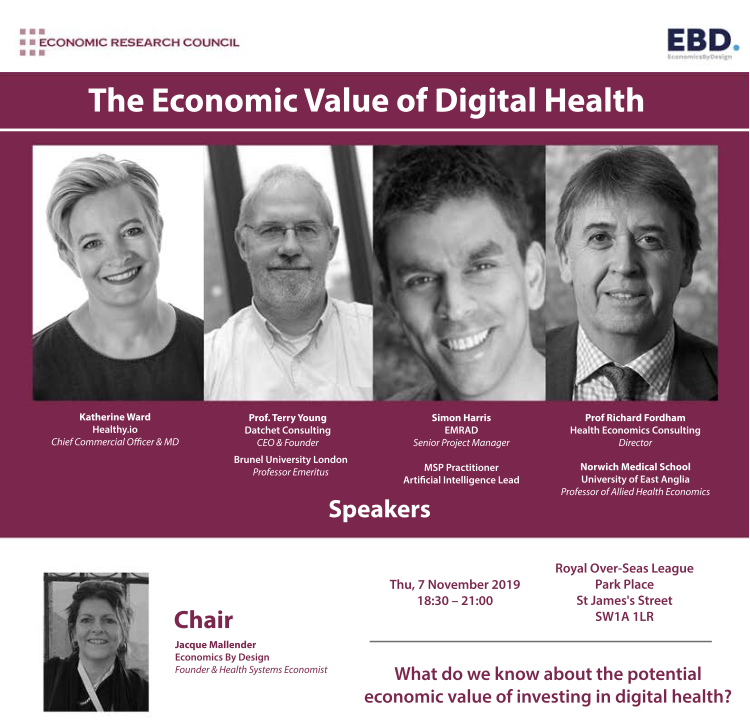
This talk was held with kind support from Economics By Design.
This event will explore where digital health has the potential to add value to the economy, the taxpayer, patients, carers and families and to wider society. The picture is complex; the digital health agenda is moving forward fast with the spread and adoption of telemedicine, the electronic patient record and smartphone apps, sensors, and wearables for diagnosis, treatment and monitoring. Add to this the increasing use of virtual and augmented reality tools to enable specialist support and training and the adoption of robotics for back-office functions, clinical interventions and rehabilitation. As we develop our increasing knowledge around Genomics, the use of AI and natural language processing these too will become embedded within these technologies offering huge scope for deep analytics driven health and care. But how do digital health providers demonstrate their value impact, how do budget holders justify investments when benefits are to be felt by others and how does government reap the benefits of these investments for the taxpayer.
Royal Overseas League, Park Place, St James Street, SW1A 1LR
Economic Cost of Chronic Disease
with
Michael Mosley and Patrick McIntosh
6th November 2019


TV Doctor Michael Mosley and long-time ERC member Patrick McIntosh will deliver a talk on population-wide health challenges and their economic cost. Patrick McIntosh is triple cancer survivor who is keen to share his views on the economic importance of eating, awareness, illness, mental health, linked specifically to climate change, farming, supply chains, blockchain and big data. With one third of NHS budget going on diabetes-related issues often because we eat the wrong food take no exercise, the need for such a perspective is clear.
In 2012, Patrick McIntosh was diagnosed with cancers of the bowel, prostate and skin in quick succession but thanks to early diagnosis he was able to have life-saving surgery. Just months after being given the ‘all-clear’, he walked to the South Pole in extreme temperatures to inspire others and prove what’s possible following cancer. Now Patrick is taking on a new challenge – cycling from Twickenham to Tokyo: a journey of over 7,500 miles and climbing more than 50,000m of ascent, crossing Holland, Germany, Denmark, Sweden and all of Russia from St Petersburg to Vladivostok.
Patrick is cycling to raise money for the World Cancer Research Fund (www.wcrf-uk.org) and his local hospice, St Catherine’s in Crawley (www.stch.org.uk). Once he reaches Japan, Patrick plans to take a well-earned rest, before continuing cycling in 2020 across North America and Iceland.
To support and follow Patrick McIntosh’s Life Cycle – A Global Ride to Fight Cancer, please visit: https://uk.virginmoneygiving.com/patrickmcintoshlifecycle
Royal Overseas League, Park Place, St James Street, SW1A 1LR
Productivity and the Bonus Culture
with
Andrew Smithers
9th October 2019

Living standards in the UK and US are in danger of falling. A decline in growth due to poor productivity and an unfavourable change in demography has weakened the stand of liberal democracy, and voter dissatisfaction is encouraging populist policies that threaten even worse outcomes. Whilst living standards once grew faster than productivity they now grow more slowly, and the working population is no longer growing faster than the population as a whole. To avoid falling living standards the productivity problem must be addressed.
Andrew Smithers argues that faster productivity does not depend, as many suggest, on technology; it also relies on investment. Current growth theory is based on a faulty model which has induced pessimism about our ability to encourage more growth. Productivity and the Bonus Culture sets out a revised model which demonstrates that weakness in productivity is the result of the bonus culture,
and suggests ways to change this flawed system so that investment is encouraged and growth returns.
Andrew Smithers is a leading expert on financial economics and global asset allocation. His forty-five years’ experience in international investment included twenty-seven years at SG Warburg & Co where, amongst other roles, he ran the very successful investment management division.
For over 20 years until its closure in August 2014 he ran his own investment consultancy firm, Smithers & Co. Ltd, based in London, advising fund managers both in the UK and globally on international asset allocation.
He is the author of several well received books on international finance: Valuing Wall Street, co-written with Stephen Wright, published in 2000 (McGraw-Hill), and Japan’s Key Challenges for the 21st Century, co-written with David Asher, published in 1999. His book Wall Street Revalued – Imperfect Markets and Inept Central Bankers was published in July 2009 (John Wiley & Sons, Ltd.). He is also the author of Chapter 6, “Can We Identify Bubbles and Stabilize the System?” in The Future of Finance: The LSE Report, published by The London School of Economics and Political Science in September, 2010. Another book, The Road to Recovery: How and Why Economic Policy Must Change, was published in 2013 (John Wiley & Sons, Ltd.). In early 2014 he was invited to write a blog on FT.com which created much interest.
Andrew has been a Trustee of the Daiwa Anglo-Japanese Foundation and a member of the Advisory Board for the Centre for International Macroeconomics and Finance (“CIMF”) at Cambridge University and is a Fellow of CFA (UK).
As head of Smithers & Co., Andrew helped pioneer the application of academic analysis of financial economics to investment management. He is well known for his work on valuing markets including the application of ‘q’, for his pioneering studies on the distorting impact of employee stock options on US profits and for work on showing the understatement of Japanese published profits compared with US ones.
In July 2019 his latest book Productivity and the Bonus Culture was published by Oxford University Press, as was a more technical critique on consensus growth theory and an explanation of his suggested alternative in World Economics under the title “The NTV Model for Total Factor Productivity”. Having closed Smithers & Co Andrew continues to actively engage with his usual intellectual rigour in topics of economic consequence for G8 countries
Royal Overseas League, Park Place, St James Street, SW1A 1LR 6.30-8pm
Hitler and the ‘Have-Nots’
with
Professor Brendan Simms
11th September 2019

Cambridge Historian Professor Brendan Simms will deliver a talk examining the economic policy of Hitler, and how this fed into his rise to power. ‘This lecture will show that Hitler’s main concern was not the Soviet Union and Communism, but Anglo-America and capitalism’. Against the current geopolitical backdrop and rising global anti-semitism, this promises to be an informative talk.
Royal Overseas League, St James’s Street, SW1A 1LR. 6.30pm – 8pm.
Elizabeth Truss MP
Chief Secretary to the Treasury
12th June 2019
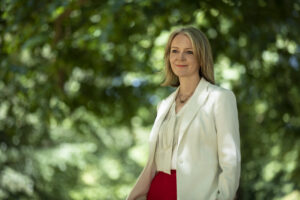
Liz Truss is Chief Secretary to the UK Treasury, responsible for keeping a tight rein on public spending. She is currently working on the UK’s post-Brexit economic strategy including a three year plan for public spending and a package of supply side reforms.
She served as Justice Secretary where she was an advocate of prison and judicial reform. She also served as Environment Secretary.
As Education Minister she introduced greater rigour to the school curriculum and exams. She was first elected in 2010, establishing the Free Enterprise group of Conservative MPs which champions free markets, a smaller state and low taxes. She also supports the Freer initiative for economic and social freedom.
Brought up in Leeds, she studied Philosophy, Politics and Economics at Oxford University and worked at Shell and Cable & Wireless prior to entering politics. She is married with two daughters.
‘Brexit: How will the MPC respond?’
with
Jacob Nell
17th April 2019

Jacob Nell is a Managing Director at Morgan Stanley, and chief UK economist. He joined the firm in December 2010 and worked for four years as the Russia economist, based in Moscow. Prior to joining Morgan Stanley, Jacob worked for over five years in the oil industry at BP in London, where he worked on strategy for Lord Browne, and at BP and TNK-BP in Moscow, including as commercial director for greenfield projects. Previously, he worked for ten years at the UK Treasury, including a stint in the Prime Minister’s Policy Directorate at No.10 Downing Street (2001-03). He has also worked for extended periods at the Russian (1995-97), Azerbaijani (1999-2001) and Iraqi (2003-04) Ministries of Finance, and worked for two years as assistant editor of the journal Central Banking. Jacob has a BA degree in PPE from Balliol College, Oxford, and an MSc in Economics from Birkbeck College, London.
Royal Overseas League, St James’s Street, SW1A 1LR. 6.30pm – 8pm.
The Half-Life of Economic Injustice
with
Prof. David Miles
20th March 2019

David Miles is Professor of Financial Economics at Imperial College, London. He was a member of the Monetary Policy Committee at the Bank of England between May 2009 and September 2015. As an economist he has focused on the interaction between financial markets and the wider economy. He was Chief UK Economist at Morgan Stanley from October 2004 to May 2009.
In 2004 he led a government review of the UK mortgage market. He recently completed a review for the UK Treasury on reference prices of UK government bonds. He is an advisor to the IMF.
He is a research fellow of the Centre for Economic Policy Research and at the CESIFO research institute in Munich. He is Chair of the Board of Trustees of the Institute for Fiscal Studies. He was awarded a CBE in January 2016.
The History of Tax Policy & its Future
with
Gemma Tetlow
27th February 2019

What makes tax policy so difficult to reform? What have been its successes and failures? Where are the most urgent reforms needed today? How can we equip our tax system to keep pace with our transforming economy?
Gemma Tetlow is now chief economist at the Institute for Government, and will endeavour to answer these questions in her talk. The institute aims to improve the effectiveness of government through providing rigorous research and analysis, topical commentary and offering a space for discussion and fresh thinking. Gemma joined the organisation in April 2018 and works across the institute’s programme areas.
Between 2016 and 2018, Gemma was Economics Correspondent at the Financial Times, reporting on and analysing economic developments in the UK and globally. Before that, Gemma led the Institute for Fiscal Studies’ work on public finances and pensions. Gemma has a PhD in economics from University College London.
The 8th Annual Clash of the Titans
5th December 2018 from 7pm
Economic Forecasting Competition in association with KPMG
 Melanie Baker – Senior Economist, Royal London Asset Management
Melanie Baker – Senior Economist, Royal London Asset Management
Melanie Baker is RLAM’s Senior Economist with over 18 years’ experience in the financial sector. She started her career at Morgan Stanley where she was an economist analysing currencies. She was Senior UK Economist at Morgan Stanley and analysed the UK economy and political risk events for more than a decade. Her period covering the UK included the aftermath of the financial crisis, Scotland’s Independence referendum and Brexit. She is a CFA charterholder and is also a Trustee of a local charity providing community childcare. She attended Edinburgh University and has a master’s degree in Economics from University College London.
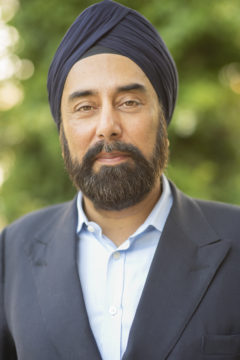 Professor Jagjit Chadha – Director, National Institute of Economic and Social Research
Professor Jagjit Chadha – Director, National Institute of Economic and Social Research
Jagjit Chadha is the Director of NIESR and an expert on financial markets and monetary policy, as well as aspects of monetary and financial history. He has written widely on the design of monetary, fiscal and financial policies. His main research interests are developing the links between finance and macroeconomics in general equilibrium models and has published widely in economics journals. He is also editor of the Cambridge University Press series on economics, Modern Macroeconomic Policymaking and an associate editor of several journals. He has recently published a book on Developments in Macro-Finance Yield Curve Modelling by Cambridge University Press and a number of papers related to the impact of quantitative easing on financial market prices. He is Professor of Economics at the University of Kent, and also part-time Professor of Economics at Cambridge. He was previously Professor of Economics at the University of St Andrews and Fellow at Clare College, Cambridge. He has worked at the Bank of England as an Official working on Monetary Policy and as Chief Quantitative Economist at BNP Paribas, and has served as Chair of the Money, Macro, Finance Study Group. He has also acted as Specialist Adviser to the House of Commons Treasury Committee and academic adviser to both the Bank of England and HM Treasury, and to many central banks as well as the Bank for International Settlements, and held the post of Gresham Professor of Commerce from 2014-2018.
 Dr Adrian Paul – Chief UK Economist, Goldman Sachs
Dr Adrian Paul – Chief UK Economist, Goldman Sachs
Adrian Paul is an economist in the European Economics team. He first joined Goldman Sachs as an economist in 2009 and rejoined the firm after leaving in 2012 to return to university. Adrian received a Ph.D. in Economics from the University of Oxford, having completed an M.Phil. in Economics in 2014. During his doctoral studies, he was a Lecturer in Economics at St. Hugh’s College, Oxford. Adrian earned an M.Sc. in Finance from the London School of Economics, and an M.A. and a B.A. in Economics from the University of Cambridge.
 Our host for the evening is Yael Selfin, Chief Economist at KPMG.
Our host for the evening is Yael Selfin, Chief Economist at KPMG.
Yael is Chief Economist at KPMG in the UK. Her research centres on the impact major issues including Brexit and other geopolitical events are likely to have on the economy as well as on individual businesses. Prior to joining KPMG in 2014 she worked at two independent economic consultancies as well as at PwC for over 14 years, where she set up and led their Macro Consulting business, as well as oversaw their international economic research. She has a BSc in Economics from UCL and did further studies in Advanced Econometrics at LSE. She also has a Chartered Accountant qualification.
Populism, Turmoil & the End of Central Bank Support:
What lies ahead for markets?
with Michael Mackenzie,
21st November 2018

Royal Overseas League, St James’s Street, SW1A 1LR. 6.30pm – 8pm.
‘Your Property: Boom or Bust?’
A Debate on the Future of Housing
23rd October 2018

Based on the popular event of the same title last year, the Economic Research Council are hosting a sixth discussion to debate the future of housing and house prices, and what we can expect to happen to the UK’s property market in the future. Last year we examined the Build-to-Rent sector, but this year’s event will return to a consumer focus- what will happen to the value of your home? Will you ever be able to afford a home? Which areas are booming?
This year’s event will once again feature expert speakers who shall each offer a different perspective on the property market. More will be announced soon but the below are confirmed:
- Camilla Dell – Managing Partner and founder of Black Brick Property Solutions LLP.
- Marcus Dixon – Head of Research at LonRes, the property data system.
- Chris Baldwin – Partner, Corporate Finance Real Estate, Deloitte
The ERC’s Sixth Annual “Boom or Bust” Property Debate, kindly supported by Deloitte Real Estate
Deloitte Real Estate, 2 New Street Square, EC4A 3BQ. 6.30pm – 9pm.
‘Egalitarian Capitalism’
with
Gavin Oldham
11th September 2018
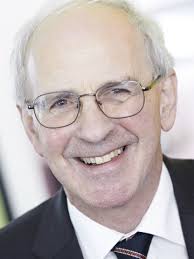
Gavin Oldham is the founder of The Share Centre, having previously established Barclayshare (now Barclays Stockbrokers) for Barclays Bank. Gavin plays an active role in business affairs and is a regular contributor to radio and TV. He received the Editor’s award for services to private investors from the FT/investors Chronicle in 2013. In 2005 he founded The Share Foundation and in 2014 founded Share Radio Limited. He is managing director of both those organisations and also an elective lay member of the General Synod, a Church Commissioner and a member of its Assets Committee.
Royal Overseas League, St James’s Street, SW1A 1LR. 6.30pm – 8pm.
Non-members can book Early Bird tickets here for £15 (£10 for students). Members can reserve their free place by emailing us info@nullercouncil.org.
Shanker Singham
Special Trade Commissioner at Legatum Institute
26th June 2018
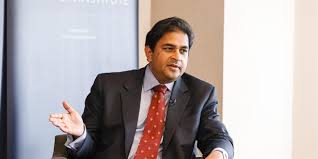
Shanker Singham leads the Legatum Institute’s work on the Economics of Prosperity and is Chairman of their Special Trade Commission. He is a leading expert on international trade, and a regular commentator on the UK’s future trade relationships after Brexit. He has advised governments and companies around the world on trade initiatives, including the accession of Poland and Hungary to the EU and of China and Russia to the WTO. Shanker has served as a trade advisor to the United States government and to a host of US political candidates, including working with Mitt Romney on his 2008 and 2012 Presidential campaigns. Prior to joining the Legatum Institute, he was head of market access at Squire Sanders and Managing Director of the Competitiveness and Enterprise Cities project at Babson Global. He is the author of A General Theory of Trade and Competition: Trade Liberalisation and Competitive Markets (Cameron May Publishing, 2007) and a Bretton Woods Committee member.
Innovate or Stagnate:
Can Technology keep the NHS Healthy at 70?
May 15th 2018
2018 marks the 70th anniversary of the formation of the NHS, the largest single-payer health system in the world. Now facing unprecedented challenges, the NHS is under pressure from not just an ageing population but the need to deliver ever more preventative, personalised, innovative and integrated care cost-effectively. Without doubt, the next ten years will deliver a myriad advanced therapies, from cell and gene therapies, to a revolution in AI, the utilisation of blockchain and potential for a human Internet of Things. Can the NHS afford these? What role will technology play and can it keep the NHS healthy at 70?
This evening event brought together some of the leading minds at the forefront of technological transformation in healthcare, who delved into these themes and explore the opportunities and trials ahead.
Confirmed speakers include:
- Sir Muir Gray CBE, Director, Better Value Health Care
- Dr Nadine Haram, Surgeon and co-founder of Proximie
- Tom Miller, CEO Greybird Ventures
The speakers shared their insight on the following topics:
- Investing in Technology to Release Value
- Optimising Care Pathways to Deliver Maximum Benefit
- Getting More for our Money on the Frontline
Royal Overseas League, St James’s Street, SW1A 1LR. 6.30pm – 8pm.
‘Platform Capitalism’
with
Nick Srnicek
24th April 2018

Nick Srnicek is currently a faculty member at King’s College London and author of ‘Platform Capitlism’.
What unites Google and Facebook, Apple and Microsoft, Siemens and GE, Uber and Airbnb? Across a wide range of sectors, these firms are transforming themselves into platforms: businesses that provide the hardware and software foundation for others to operate on. This transformation signals a major shift in how capitalist firms operate and how they interact with the rest of the economy: the emergence of ‘platform capitalism’.
Nick Srnicek critically examines these new business forms, tracing their genesis from the long downturn of the 1970s to the boom and bust of the 1990s and the aftershocks of the 2008 crisis. He will show how the foundations of the economy are rapidly being carved up among a small number of monopolistic platforms, and how the platform introduces new tendencies within capitalism that pose significant challenges to any vision of a post-capitalist future. This book will be essential reading for anyone who wants to understand how the most powerful tech companies of our time are transforming the global economy.
Rethinking the Economics of Land and Housing
with
Josh Ryan-Collins and Laurie MacFarlane
28th March 2018

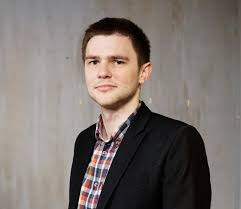
Josh Ryan-Collins is Senior Research Associate at the Centre for Innovation and Public Purpose at UCL. Laurie MacFarlane is the Economics Editor of opendemocracyUK. Together they will be discussing their book, ‘Rethinking the Economics of Land and Housing’, described by the Financial Times as “a lucid exposition of the dysfunctional British housing market”..
Why are house prices in many advanced economies rising faster than incomes? Why isn’t land and location taught or seen as important in modern economics? What is the relationship between the financial system and land?
In this accessible but provocative guide to the economics of land and housing, the authors reveal how many of the key challenges facing modern economies – including housing crises, financial instability and growing inequalities – are intimately tied to the land economy. Looking at the ways in which discussions of land have been routinely excluded from both housing policy and economic theory, the authors show that in order to tackle these increasingly pressing issues a major rethink by both politicians and economists is required.
Royal Overseas League, St James’s Street, SW1A 1LR. 6.30pm – 8pm.
Dame Minouche Shafik
Director, London School of Economics
28th February 2018
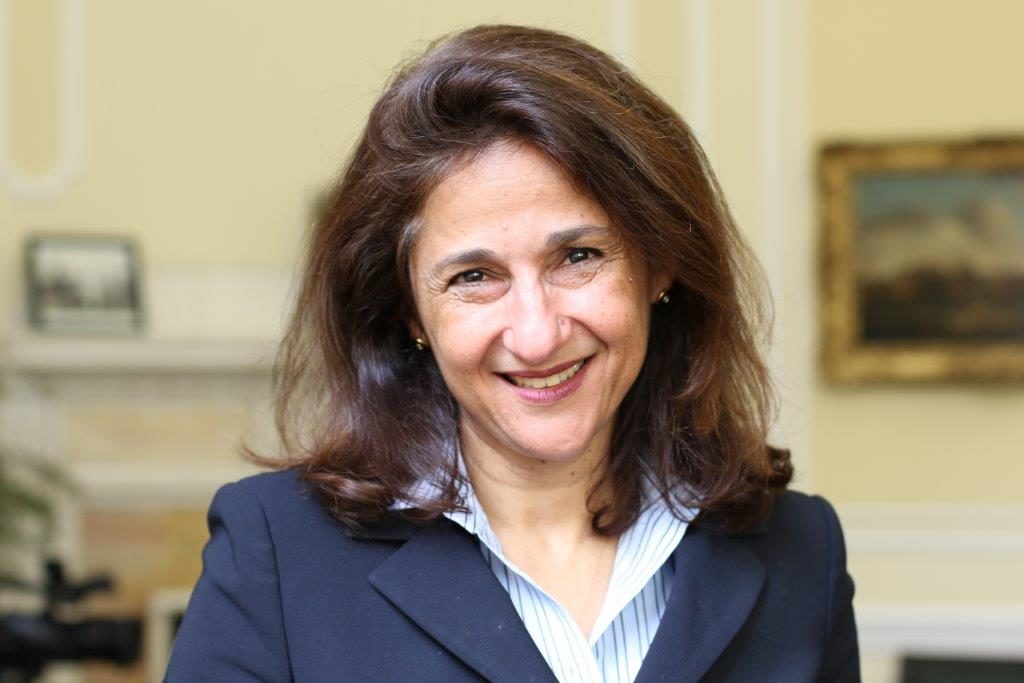
Dame Minouche will be Director of the London School of Economics from September 2017. She was Deputy Governor for Markets and Banking at the Bank of England, where she had responsibility for the Bank’s balance sheet and its interaction with financial markets. She is a member of the Monetary Policy Committee, the Financial Policy Committee and the Board of the Prudential Regulation Authority. Prior to joining the Bank, she was Deputy Managing Director of the International Monetary Fund from 2011-2014 where she was responsible for policy and programmes in Europe and the Middle East. Prior to that she was Permanent Secretary of the UK’s Department for International Development. She has held academic appointments at the Wharton Business School of the University of Pennsylvania and the Economics Department at Georgetown University and published on a variety of economic topics.
Royal Overseas League, St James’s Street, SW1A 1LR. 6.30pm – 8pm.
What was the cause of the Great Recession:
Bankers or Policy-Makers?
Lord Lamont and Prof. Tim Congdon
23rd January 2018

Prof. Tim Congdon is the editor of the recently published “Money and the Great Recession – did a crash in global money growth cause the global slump?” in association with the Institute of Economic Affairs. Lord Lamont wrote the foreword and will be introducing Professor Congdon’s talk.
Banks and free markets are still held entirely culpable for the financial crisis despite evidence pointing in other directions. This book examines the role that monetary policy operated by central banks played in the great recession. Edited by Professor Tim Congdon, the authors of the book use their experience to marry theory and practice, demonstrating their understanding of the real underlying causes of the slump following the financial crisis. Parallels are drawn with central bankers’ similar mistakes in the Great Depression in the US.
Royal Overseas League, St James’s Street, SW1A 1LR. 6.30pm – 8pm.
Called to Account
with
Dame Margaret Hodge MP
Tuesday 7th November 2017
The book is about her time as Chair of the Public Accounts Committee. After five years following the taxpayers’ pound, Dame Hodge has written about the ‘unconscionable amounts of waste and inefficiency’ she observed, in particular on watching ‘too many big companies, aided by advisers, banks and lawyers get away without paying their fair share of tax’.
Dame Hodge will share her stories from the frontline and give you her take on the lessons that should be learnt for the future so that all taxpayers get better value for money.
Northern Rock 10 years on: Is UK banking sound?
with
Professor Kevin Dowd
Thursday 14th September 2017
Professor Kevin Dowd is a Senior Fellow with the Cobden Centre and a long-standing free market economist whose main work has been on free banking and unregulated monetary systems. Over the years, he has written extensively on the history and theory of free banking, the mechanics of monetary systems without the state and the failings of central banking and financial regulation. He will be discussing his report into the inadequacies of stress testing methods for banks, which received significant coverage in the summer of 2016.
‘What do Brexit, Corbyn and Trump tell us about Inequality?’
with
Dr Faiza Shaheen
Tuesday 13th June 2017
Dr Faiza Shaheen is Director of CLASS, joining in February 2016. Prior to this, Faiza was Head of Inequality and Sustainable Development at Save the Children UK, where she led on the development of a new global campaign on inequalities in child outcomes, and Senior Researcher on economic inequality at the New Economics Foundation (NEF).
Faiza is an economist, writer, activist and commentator. She is the author of a range of materials and publications covering the most salient social and economic debates of our times, including inequality, austerity, immigration, youth unemployment and social mobility. Faiza is a regular contributor to debates on popular news programmes including Newsnight and Channel 4 News, and has worked with Channel 4 and the BBC to develop documentaries on inequality.
Faiza was born and raised in East London. She has a BA in Philosophy, Politics and Economics from St John’s College, Oxford University, and both an MSc in Research Methods & Statistics and a PhD from the University of Manchester. Her PhD charted the changing geography of poverty between 1971 and 2001 in the UK, and modelled the economic, demographic and societal factors driving these trends.
The Unintended Effects of Quantitative Easing
with
Baroness Dr Ros Altmann
Tuesday 24th May 2017
Baroness Altmann is a leading authority on all aspects of pensions, from investment strategy to company pensions, state pension policy, retirement and annuities, Dr Ros Altmann is also famous as a champion for the rights of pensioners, having spearheaded a multi-year campaign to force Government to restore lost pensions to 140,000 victims of the company pensions scandal. She will be discussing the current pensions crisis. She will be discussing the unintended effects of Quantitative Easing and its effect on pension funds.
‘Central Bank Engagement with Society’
with
Andrew Haldane
Tuesday 25th April 2017
Andrew has an Honorary Doctorate from the Open University, is Honorary Professor at the University of Nottingham, a Visiting Fellow at Nuffield College, Oxford, a member of the Economic Council of the Royal Economic Society, a Fellow of the Academy of Social Sciences and a Member of the Research and Policy Committee at Nesta. Andrew is Chairman and co-founder of Pro Bono Economics, a charity that matches volunteer economists with charitable projects.Andrew has written extensively on domestic and international monetary and financial policy issues and has published over 150 articles and four books. In 2014, TIME magazine named him one of the 100 most influential people in the world.
What do Brexit and Trumponomics mean for Markets?
with
Keith Wade
Wednesday 29th March 2017
Keith Wade is Group Chief Economist at Schroders, joining in 1988. He is responsible for the Economics Team and Schroders’ view of the world economy. His role also involves formulating asset allocation strategies and he is also a member of the Group Asset Allocation Committee. He became Schroders’ senior Economist responsible for international economic forecasting in early 1992. Prior to joining Schroders Keith was a researcher at the London Business School’s Centre for Economic Forecasting. He obtained a MSc and BSc in Economics at the London School of Economics and is a member of the UK Society of Investment Professionals (UKSIP), Society of Business Economists and holds the Investment Management Certificate (IMC). Keith is also sits on the investment committee for Addenbrookes hospital charity fund in Cambridge. A regular contributor to the press, he has co-authored a book on macroeconomics for MBA students.
Why are so many economists opposed to Brexit?
with
Paul Ormerod
Monday 20th February 2017
Paul Ormerod is a partner of Volterra Partners and a Visiting Professor in the Centre for Decision Making at University College London (UCL). He has written 4 bestselling books, Death of Economics, Butterfly Economics, Why Most Things Fail and Positive Linking. He was elected a Fellow of the British Academy of Social Sciences in 2006, and has been awarded an honorary DSc by Durham University for ‘the distinction of [his] contribution to economics’. After reading economics at Cambridge and taking the MPhil in economics at Oxford, Paul started his career as a macroeconomic forecaster at the National Institute of Economic and Social Research (NIESR). He was a founder of the Henley Centre for Forecasting in the 1980s, which the founders sold to Martin Sorrel’s WPP Group in the 1990s.
Paul has a number of academic publications querying the inherent feasibility of accurate short-term macroeconomic forecasting, including a paper in Physica A, the world’s leading statistical physics journal, on “Random matrix theory and the failures of macroeconomic forecasting”.
India & China: Rivals or Partners?
with
Dr Jonathan Ward
Wednesday 18th January 2017
Jonathan Ward has recently completed his DPhil at the University of Oxford specialising in China-India relations with a dissertation on the China-India Border War of 1962. He studied Philosophy, Russian and Chinese at Columbia University in New York City as an undergraduate, and continued his language studies at Beijing University in China and St. Petersburg State University in Russia. From 2006 – 2011 he lived and traveled extensively in Russia, China, Latin America, and the Middle East, and speaks Russian, Chinese, Spanish and Arabic. He consults on China-India relations, the Indian Ocean Region, and Maritime Asia for Oxford Analytica, and is a member of the International Institute for Strategic Studies and the Energy Institute. Prior to beginning his doctoral studies, he completed a master’s degree in Global and Imperial History at the University of Oxford.
2016
20/01/16: Jon “JB” Beckett
Author of New Fund Order, New Fund Order: Dysfunctions and Disrupters in the City
08/03/16: John Whiting & Angela Knight
Tax Director and Chair of Office of Tax Simplification, Simplifying the UK Tax System
19/04/16: Richard Murphy
Director of Tax Research UK, The Joy of Tax
03/05/16: EU Referendum Debate
Andrew Lilico and Charles Grant debate Brexit: The Economic Arguments For and Against
08/06/16: Fourth Annual Boom or Bust Property Discussion
Ed Mead (Douglas & Gordon), Camilla Dell (Black Brick), Dan Bayley (BNP Paribas), and Neal Hudson(Savills)
12/09/16: Stuart Block
The Economic Cyclist: Cycling to China along Silk Roads Old and New
11/10/16: Sir Charles Bean
Making Economic Statistics fit for the 21st Century
07/11/16: Larry Elliott and Dan Atkinson
Europe isn’t Working: How the Failure of the Single Currency led to Brexit
2015
27/01/15: Matthew Elliott
Chief Executive of Business for Britain, Business and the EU: The Underlying Divisions
25/02/15: Felix Martin
Author of Money: The Unauthorised Biography”, The Ends of Monetary Policy
24/03/15: Richard Blundell
Research Director at the IFS and Professor of Economics at UCL, Wages, Inequality and Living Standards
20/04/15: John Gapper
Chief Business Commentator at the Financial Times, Technology and the Economy
18/05/15: Pete Comley
Author of Inflation Matters”, Inflationary Wave Theory
16/06/15: Third Annual Boom or Bust” Property Discussion
Peter Rollings (Marsh & Parsons), Charlie Ellingworth (Property Vision), Paul McFadyen (Regis Group), and Lucian Cook (Savills)
14/10/15: Ruth Lea
Economic Adviser to the Arbuthnot Group, A New Relationship for the UK with the EU
02/11/15: Sir Vince Cable
Former Secretary of State for Business, Innovation and Skills, Another Storm Ahead?
02/12/15: Clash of the Titans V
Andrew Sentance, Rain Newton-Smith, Dr Sean Holly, Jonathan Portes
2014
20/01/14: Musa Okwonga
Author and Broadcaster, The Football Crash: Are Footballers the Bankers of Professional Sports?
24/02/14: David Craig
Author, The Great Savings and Pensions Scandal
25/03/14: James Hindhaugh
Managing Director of Trufflenet, The Chancellor vs. The People: A Social Media Analysis of the Budget
29/04/14: Jan Skoyles
Head of Research at the Real Asset Co., Gold, Bitcoin and the Future of Money
28/05/14: EU Debate
Tim Congdon and Charles Grant debate Is the British Economy Better Off In or Out of the EU?
11/06/14: Second Annual Boom or Bust Property Discussion
Grainne Gilmore (Knight Frank), Matthew Pointon (Capital Economics), and James Wyatt (Parthenia)
10/09/14: Katie Morley
Finance Writer (Investors Chronicle) and FT Columnist, A Generation that is Young, Rootless and Broke
06/10/14: John Mills and David B. Smith
Britain’s Economic Future: There is an Alternative
18/11/14: Martin Wolf
Chief Economics Commentator at the Financial Times, The Shifts and the Shocks
18/12/14: Clash of the Titans IV
Andrew Sentance, John Llewellyn, Kate Barker, and Michael McMahon
2013
09/01/13: Stuart Block
Economist and Teacher, The Economic Cycle: An Economist’s Journey by Bicycle from South Africa to London
05/02/13: Richard Fleming
Head of Advisory and Restructuring, KPMG, The Prospects for British Business
09/04/13: Tom Chatfield
Author, Virtual Economics: Bitcoins and Beyond
08/05/13: Mark Schneider
President of College Measures, Is Higher Education Worth the Cost?
04/06/13: Your Property: Boom or Bust? 2013
Yolande Barnes (Savills), James Wyatt (John D Wood & Co), Liam Bailey (Knight Frank) and James Ferguson (The Macrostrategy Partnership LLP)
11/09/13: Andrew Smithers
Chairman of Smithers & Co., The Road to Recovery: How and Why Economic Policy Must Change
09/10/13: Hayek vs Keynes Debate
Guy Fraser-Sampson and Michael Kitson debate Whose theories can best deliver recovery and growth in the UK – Hayek or Keynes?
06/11/13: Sarah Harper
Director of the Oxford Institute of Population Ageing, The Economic and Political Effects of an Ageing Population
10/12/13: Clash of the Titans III
Andrew Sentance, Kevin Daly, Stephen King, and Ros Altmann
2012
09/01/12: Nigel Hawkins and Michael Laughton
Publication Launch Event, The Future of Energy Policy in the UK
07/03/12: Nick O’Donohoe
CEO of Big Society Capital, Social Impact Investments: A Revolution in Financial Markets?
04/04/12: Panel Discussion
Michael Drummond, Mike Delaney and Jacque Mallender, Payment by Results in Public Services
09/05/12: Chi Onwurah MP
Shadow Minister for Innovation, Science and Digital Infrastructure, The New Innovation Economy
13/05/12: James Wyatt
Head of Valuation at John D. Wood & Co., Bubbles and Asset Prices
04/09/12: Dr Gerard Lyons
Chief Economist at Standard Chartered Bank, The Shift in the Balance of Economic and Financial Power
02/10/12: Guy Fraser-Sampson
Senior Fellow at Cass Business School, The Mess We’re In
06/11/12: John Kay
Author and Financial Times journalist, The Future of Equity Markets
04/12/12: Clash of the Titans II
Lord Lamont, Linda Yueh, Michael Kitson and Ethan Ilzetzki
2011
17/02/11: Andrew Smith
Chief Economist at KPMG, The Economic Outlook for 2011
07/04/11: Steve Moore
Director of the Big Society Network, Big Society: The Whole Equation
09/05/11: John Hawksworth
Chief Economist of PricewaterhouseCoopers, The Shift in Global Economic Power to the E7
13/09/11: James Wyatt
Head of Valuation at John D. Wood & Co., The Outlook for the Housing Market and the Implications for the Wider Economy
05/10/11: Michael Johnson
Centre for Policy Studies, Public Sector Pensions: DC is Inevitable
15/11/11: John Mills
Chairman of JML Ltd., The Exchange Rate
06/12/11: Clash of the Titans I
Lord Lamont, John Muellbauer, Hashem Pesaran and Danny Quah
2010
16/09/10: Patience Wheatcroft
Editor-in-Chief of Wall Street Journal Europe, What is the Future for Corporate Britain?
09/11/10: Jon Moulton and Jamie Constable
From Better Capital and rCapital, Will there be a double-dip recession?
09/12/10: Panel Discussion
Lord Lamont, John Peet and John Stevens, The Future for Europe

